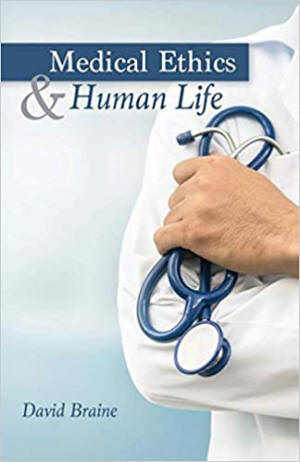Catholic Medical Quarterly Volume 69(1) February 2019
Book Reviews
Why Read The Works of Braine
Michal Pruski PHD, MA, AFHEA
 This
article serves a dual purpose. Firstly, it is a personal tribute to David
Braine, secondly it hopes to promote Braine’s work as a philosopher.
Braine died quite recently, in February 2017,[1] and while his work is not
the easiest to read, it should continue to influence bioethicist. This is
not only because his prestige as a scholar, who had some training under
Anscombe’[2] but also because he suffered from severe disability for many
years, and hence also lived out a life of Catholic bioethics.
This
article serves a dual purpose. Firstly, it is a personal tribute to David
Braine, secondly it hopes to promote Braine’s work as a philosopher.
Braine died quite recently, in February 2017,[1] and while his work is not
the easiest to read, it should continue to influence bioethicist. This is
not only because his prestige as a scholar, who had some training under
Anscombe’[2] but also because he suffered from severe disability for many
years, and hence also lived out a life of Catholic bioethics.
His obituary testifies that he was an important, if insufficiently known, philosopher[1]. Finnis acknowledged Braine in his work [3] and Cardinal Eijk references him in one of his recent papers [4]. Braine’s work was rather varied and not all of it was related to Bioethics, but below are three examples that should be of interest to CMQ readers.
Though slightly obscure, probably one of Braine’s most important contributions to bioethics is his testimony to the Scottish parliament on the End of Life Assistance (Scotland) Bill [5].It is a highly personal piece as it relates to his own experience as a disabled, wheelchair bound person (the accident that caused his disability also prevented him from entering the Dominican order) [1]. In it Braine describes his personal experience with disability and outlines the reason why society should object to physician assisted death. He also states clearly why physicians should object to such procedures. As such, this short document provides a personal testimony with an expert philosophical touch to it.
Braine authored a short booklet on bioethics [6]. It is not so much a manual for clinical practice, rather it is a general guide to the attitude a Christian should have to bioethical matters. It is very concise and refers to a lot of early Christian texts, as such it is a great starting point for any Catholic beginning their venture into Bioethics.
The last piece of Braine’s writing that I want to mention here is ‘The Human Person: Animal & Spirit’ [7]. This book is not specifically oriented towards bioethics, but it concerns human ontology - a crucial matter for bioethics. Braine presents a holistic vision of the human being, deeply rooted in the Thomistic tradition and phenomenology. It is definitively not an easy read, especially since Braine uses a lot of example from linguistics, with which a lot of the readers might not be familiar. Nevertheless, the book does a good job at tackling both materialism and dualism, and though it has been published about a quarter of a century ago, it is still relevant to the present bioethics debate’[4].
This is only a brief selection of Braine’s work. Yet, it is hoped that this account presented Braine’s writing as worthwhile to Catholics involved in healthcare and bioethics, and as a potential source of intellectual weaponry necessary to fight the good fight.
References
- Fimister A. Obituary: David Braine, leading Catholic philosopher who battled disability [Internet]. CatholicHerald.co.uk. 2017 [cited 2017 Sep 28]. Available from: https://catholicherald.co.uk/obituary-david-braine-leading-catholic-philosopher-who-battled-disability/
- Mr David Braine | Staff Profile | The School of Divinity, History and Philosophy | The University of Aberdeen [Internet]. [cited 2017 Dec 24]. No longer available online (31 March 2020)
- Finnis J. Natural Law And Natural Rights. 2 edition. Oxford ; New York: Oxford University Press, U.S.A.; 2011. 512 p.
- Eijk WJC. Is medicine losing its way? A firm foundation for medicine as a real therapeia. Linacre Q. 2017 Jul 3;84(3):208–19.
- Braine D. End of Life Assistance (Scotland) Bill ELA298 [Internet]. 2010. Available from: https://archive.parliament.scot/s3/committees/endLifeAsstBill/evidence/ELA298.pdf
- Braine D. Medical Ethics and Human Life. 2nd ed. Old Aberdeen: Palladio Press; 1983.
- Braine D. The Human Person: Animal & Spirit. London: Duckworth; 1993.
Michal Pruski, PhD, MA, AFHEA
is a Trainee Critical Care Scientist
with Manchester Metropolitan University.
